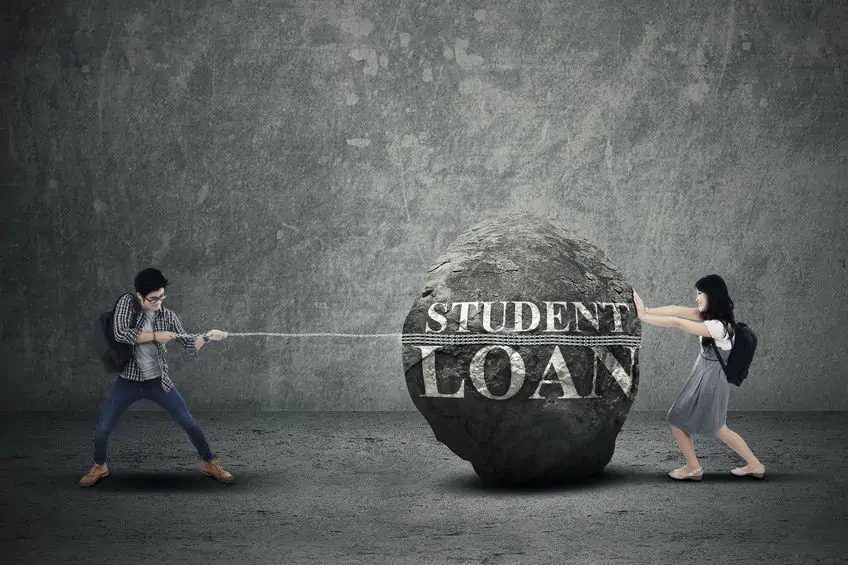Few things can give a parent such conflicting emotions like sending their first-born off to college. I now know this firsthand. Our oldest kid, Maeve, started her college experience last fall. Jill and I felt immense pride in her achievement. And while we had the satisfaction of helping to guide her to this huge life milestone, we also experienced the fear of someday losing the ability to protect and guide her on a daily basis.
Maeve’s experience, like that of her fellow college freshmen, took an unforeseen turn when college students were sent home by the masses midway through the spring semester. The pandemic sent many young adults back to their childhood bedrooms to learn online instead of the traditional “college” experience.
Similarly, much of the funding of college educations over the last couple of decades has also taken an unanticipated turn – the wrong direction, with the problem of student loan debt at the forefront. What may have started out with the good intentions of providing broader opportunities for young adults has resulted in the unintended consequence of saddling many students with significant debt. What is more troublesome is that a completely different group of people is reaping the rewards. While students today have accrued over $1.5 trillion in debt, the college and university leadership and faculty have all been paid, and paid well. So, who gets left holding the bag? Is it going to be the students or the taxpayers or some combination of the two? Maybe, its time to bring the college and universities back into the equation.
The issue of student loan debt forgiveness has developed into another national debate with a deeply divided viewpoint on how to resolve it. Unfortunately, it’s often portrayed as only two camps divided between, “a legal debt is a debt and must be repaid,” and “forgive them, they were only kids.” This is omitting a real contributor to the problem. This is the third party to the “deal”, and colleges and universities are being left out of the debate. Over 92% of student loans are the result of federal government programs. It seems that the biggest direct recipients of that money, should also have something at stake.
While there’s no doubt that many people who received student loans have developed successful careers, there are also many who have failed to complete their secondary education and have little to show for their time on campus. We may need to look at the question of whether college is truly for everyone. There are many important and fulfilling careers that do not require a four-year college degree. Perhaps we need to take a hard look at the value proposition that four-year colleges and universities offer. Academic and cultural pursuits are certainly not without value, but for the amount of taxpayer money on the line, colleges and universities need also be held accountable for their duty to stoke the engine of the US economy. According to the US Treasury, as of 2018, Student Loans represented over 36% of federal government assets.
Going forward colleges and universities need to have something at stake in the funding of post high school education. Particularly if the public sector and taxpayer is going to pay a significant role in funding their operations. At some point, those that want to “forgive” college student loan debt need to own up to the fact that everyone pays taxes, liberals, centrists, and conservatives. Any college or university that receives taxpayer funding needs to ensure that everyone has a seat at the table and true free speech and equality to all, not just some, is allowed and embraced.
Hmmm . . . equality to all and freedom of speech seems to be “left out” on campus.
In the meantime, colleges and universities need be given some sort of economic accountability when it comes to federal student loans. It could be as simple as making the colleges and universities responsible for some percentage of the outstanding loans. It also could be mandated that the educational institutions have some sort of legal responsibility to help pursue the full amount of the loan.
Folks, my own personal experience of already having one child in college, and more than likely another two starting their secondary academic educations in the near future may make it seem like I have more at stake. I get it. But you know, the reality is that the student loan crisis affects all of us who pay taxes. It affects all of our financial lives and needs a deeper look and a more thoughtful approach than the dialogue that is taking place today.
So as always – be vigilant and stay alert, because you deserve more!
Have a great week.
Jeff Cutter, CPA/PFS is President of Cutter Financial Group, LLC, an SEC Registered Investment Advisor with offices in Falmouth, Duxbury, Mansfield & Southlake, TX. Jeff can be reached at jeff@cutterfinancialgroup.com.
This article is intended to provide general information. It is not intended to offer or deliver investment advice in any way. Information regarding investment services is provided solely to gain a better understanding of the subject of the article. Different types of investments involve varying degrees of risk. Therefore, it should not be assumed that future performance of any specific investment or investment strategy will be profitable. Market data and other cited or linked-to content in this article is based on generally-available information and is believed to be reliable. Cutter Financial does not guarantee the performance of any investment or the accuracy of the information contained in this article. Cutter Financial will provide all prospective clients with a copy of Cutter Financial’s Form ADV 2A and applicable Form ADV 2Bs. Please contact us to request a free copy via .pdf or hardcopy. Insurance instruments offered through CutterInsure, Inc.




